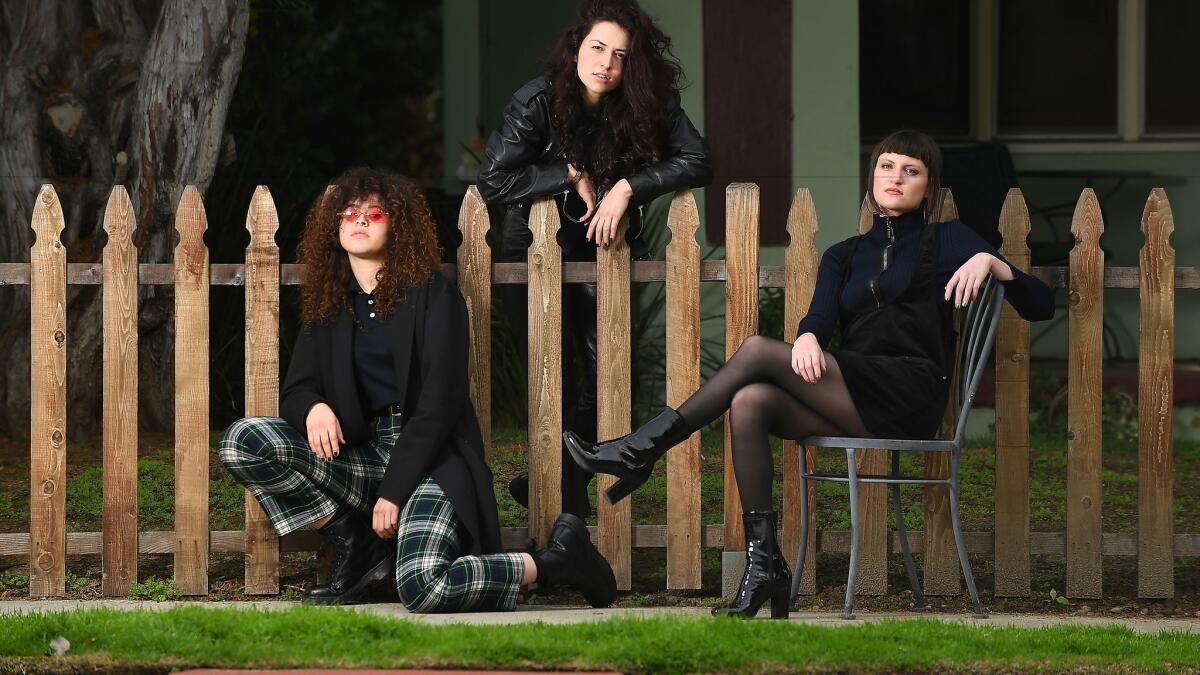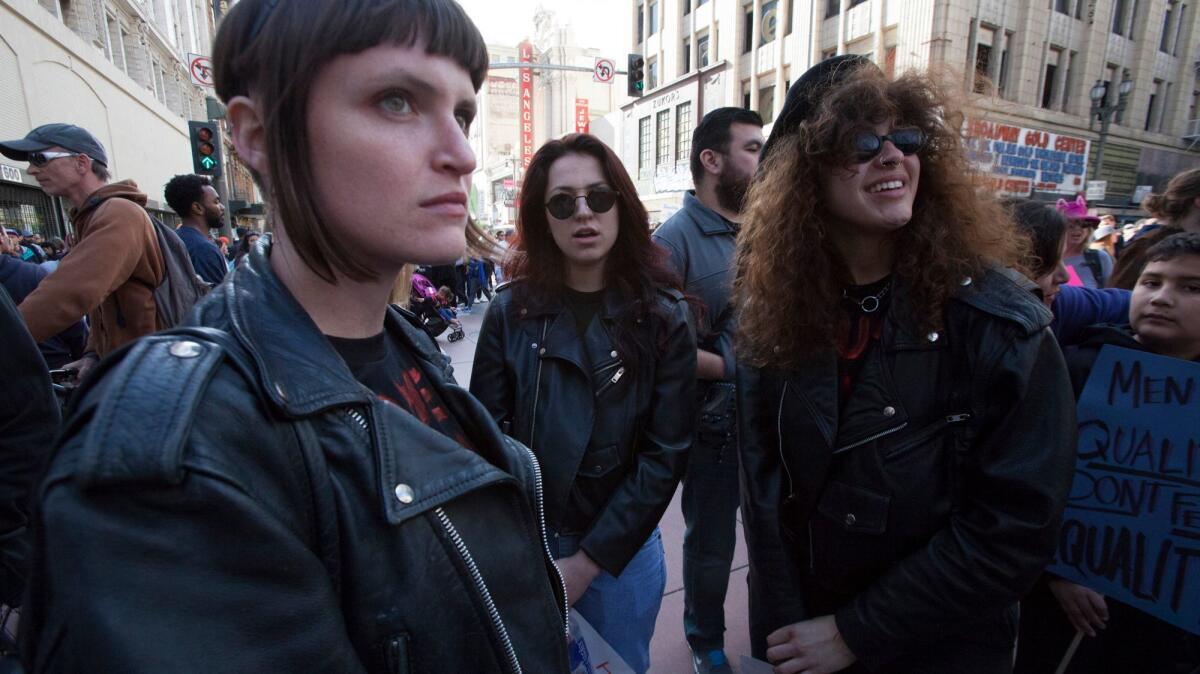Muna, which doesn’t shy away from big topics, is a local band on a mission

“My dad told us to beware of skinheads,” says 22-year-old Muna guitarist Josette Maskin at 9 a.m. on the day of the women’s march in Los Angeles.
She’s carrying a bag of her own baked cookies for protest fuel, hanging at 24-year-old bandmate Naomi McPherson’s house, where the bookshelves are stacked with Clash albums and Fran Lebowitz tomes.
For the record:
8:12 a.m. Nov. 7, 2024An earlier version of this story listed the release date of Muna’s “About U” as Feb. 7. It is Feb. 3. Additionally, a reference to the band wearing anti-Donald Trump T-shirts at Lollapalooza initially incorrectly stated that the moment occurred at the Governors Ball in New York.
At the dining room table the synth-pop trio is decorating signs and picking out uniforms for the day. Singer Katie Gavin, 24, points at her own haircut, one that’s buzzed at the back. She’s a seasoned L.A. protester, and there have been instances where clashing skinheads have assumed she’s one of them. An ally to Black Lives Matter and an LGBTQ activist, she’s very blatantly not a skinhead.
Muna laughs it off — the rising Los Angeles band is used to being seen before it’s heard.
The band’s sexual politics are always the entry point for discussion. The group identifies as “queer,” which makes the act inherently political. “Some bands are afraid,” says Gavin, “because it’s scary to put yourself out there.”

They met at USC four years ago and have looked like a gang ever since. It’s an aesthetic that’s part “The Craft,” part ’90s sci-fi, and very punk. “I never don’t look like ‘The Matrix,’” laughs Gavin.
In their biker jackets, Doc Martens and custom-made activist T-shirts, they cut three unique but unified figures. If the idea of a politically fearless and entirely self-produced pop group may not seem a natural fit for a major label, especially an act so vocally opposed to our current administration, Muna is brazen in its ambitions, as Maskin says the band declared it would “change the world” when it signed with RCA.
In turn, Muna doesn’t shy away from big topics, as its songs are likely to tackle gender identity, victimization and trauma.
“Since I’ve known these guys, I’ve become more of a feminine lady,” says Maskin, joking that if she hadn’t picked up a guitar at age 7 she likely would have become a firefighter.
“We’re a 21st century band — we’re speaking directly to our audience,” McPherson says. To that end, Muna tweets about politics every day, and the act wore anti-Donald Trump T-shirts at Chicago’s Lollapalooza last summer. Gavin, on the night before the election, grabbed her crotch on the band’s first TV appearance (“The Tonight Show Starring Jimmy Fallon,” no less).
The shot didn’t make the air.
“I don’t feel at peace with that performance,” says Gavin, hung up on the idea that the band didn’t do enough with its platform. She’s excited for a upcoming February appearance on “Jimmy Kimmel Live!” Clearly, the members don’t beat themselves up over the odd compromise or major festival slot. In the words of McPherson, the band’s Yoda, “There’s a way to sneak yourselves into people’s subconscious and appeal to their empathy.”
Last year’s “Loudspeaker” EP was the act’s Trojan horse — a collection of ’80s drum machines and emo pop choruses. Beneath the shiny surface were self-lacerating, empowering and gender-neutral lyrics appealing to the marginalized. “So Special” is a tune about slut-shaming. The title track, with its manifesto, “Every time I don’t shut up it’s revolution,” is a fittingly activist anthem.
While outside L.A.’s City Hall, Gavin learns via a fan on social media that someone played it that day at a march in Texas. That’s a Muna win.
Even when not performing, Muna attempts to rally an audience. In an effort to incite her own chants in the crowds at Saturday’s march, Gavin takes the salacious chorus of Khia’s “My Neck, My Back” and switches it up to reference Trump’s now-infamous “Access Hollywood” tape.
The day before the march, Muna released another song from its full-length debut, “About U,” due Feb. 3. Titled “Crying on the Bathroom Floor,” it’s peak Depeche Mode, and as with previous releases, is accompanied by a short essay, this time about the psychological damage of abusive relationships.
Every Muna song deals in similarly weighty subjects, including “I Know a Place,” its response to the June nightclub shooting in Orlando, Fla.
Earlier this month on the set of the forthcoming music video for the song, dancers in riot-cop garb performed synchronized moves in the rain. The track is an LGBTQ anthem about seeking salvation on the dance floor: “I know a place we can go where everyone’s gonna lay down their weapons.”
The group’s work is a palette of ideas painted together via back-to-back would-be anthems. Despite an obsession with the Smiths, Chairlift, Peaches, Joni Mitchell and even Dido, the sound is recognizably Muna.
That’s largely due to Gavin’s glacial voice and songwriting.
“She’s a witchy woman, dude,” says McPherson. Gavin’s spirit was vital to founding the band. She’s as likely to reference a literary great as she is Lil Kim.
Less upfront is producer-guitarist McPherson. With a strong musical heritage (Dad is a jazz drummer, Mom played upright bass), her touch has the intensity of heart-rending ’80s radio pop.
Thanks to Maskin’s humor, ambitious guitar licks and enormous heart, the album already feels arena-ready. “I’m at a place where I know what I’m doing. I don’t want anyone to tell me how,” says McPherson, proud of the act’s creative control.
Her perfectionism is a product of a working-class background. Maskin and Gavin are open about their privileged upbringings. “You had to work twice as hard,” says Gavin to McPherson. “And now we’re twice as good.”
“Muna is just an idea to me,” McPherson says in an effort to divorce ego from the process. Hence the album title: “About U.”
“This is a service industry,” adds Gavin. “We’re as valuable as the value we give to others. I just want to provide. We’re making pop music, but we’re not trying to sell you happiness.”
Muna’s goal: to take the safety it has found in the band’s friendship and project it onto the audience, to allow fans to seek shelter under Muna’s umbrella.
As this idea is relayed to them, Gavin’s eyes start reddening and tears of joy begin to fall.
“I’d never felt myself until I met Katie and Naomi,” says Maskin, sobbing but also laughing. “I want everyone to have that when they’re with us.”
ALSO
BET didn’t skim on authenticity for ‘The New Edition Story’
‘I ain’t got no love’: Why Donald Trump’s musical choices matter
‘No, take me seriously’: Meet the Regrettes and Cherry Glazerr, L.A.’s new faces of rock
More to Read
The biggest entertainment stories
Get our big stories about Hollywood, film, television, music, arts, culture and more right in your inbox as soon as they publish.
You may occasionally receive promotional content from the Los Angeles Times.










